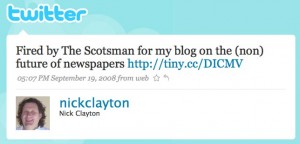I am now on week seven of my NCTJ course at Lambeth College, London.
As previous posts to the Journalism.co.uk forum will prove, I spent a large amount of time wondering whether or not to do an NCTJ course – was it worth the money and the time? Did I want to concentrate on news when I was a features writer?
I spoke to a few working journalists in the hope they could make the decision for me, but surprisingly opinion was mixed, especially in the dreaded shorthand debate (a national newspaper journalist I know doesn’t have a word of shorthand).
With the benefit of hindsight here’s my two-pence on the NCTJ:
It’s worth every penny.
Even if you want to be a features writer the NCTJ is a well-recognised qualification within the industry. There is a magazine equivalent but I’m not sure if it’s so well-known or respected.
I can only speak for the course at Lambeth but I am staggered by how much I already know about journalism, the government and the law and I can’t imagine walking into any publication – features or news – without it.
The Lambeth Course
The fast-track course at Lambeth is only 18 weeks. It’s Monday to Thursday and they expect you to spend your Fridays on work experience. The homework and revision has me working literally all the time.
The fees are £800 (international £3,390) at the moment and, according to the college website, are set to remain at that level for next February and September’s courses as well.
After that there is talk of the fees going up to a couple of grand. I found other NCTJ courses in London cost around £3K and some were wildly more expensive so at the moment Lambeth is great value for money.
While Lambeth College and the surrounding area may not be the most attractive place in London or the world (if you want leafy go to NoSweat), the course has an excellent reputation and pass rate.
The entry exam will see you writing a news story from a press release and quotes given to you. My story was about 500 plastic ducks that had been found on the local village pond. Yes, I did put: ‘Villagers thought they were going quackers…’ With phrases like that you better hire me before I get snapped up.
There is also a current affairs test with the usual questions like: ‘Who is the Chancellor?’ etc.
Once you’re on the course it is broken down into four sections:
Journalism
Mainly geared to hard news writing but I’ve found it really sharpens up feature writing as well.
You are taught what makes news and how to sub your copy to within an inch of its life to make your writing clear and concise.
It’s pretty formulaic but a quick read of any news story in a newspaper, national or local, applies the same principles.
Favourite quote from the teacher so far: “This is probably the hardest exam you will ever do.”
Law
Using the trusty tome ‘McNae’s Essential Law for Journalists’ you deal with all aspects of media law. Defamation made me want to lie down in a dark room. You also get out in the field: we went to the Jean Charles De Menezes inquest this week.
Public Affairs
Or ‘how central and local government works’. It’s an absolute minefield and I have no idea how councils function with the amount of regulations they must adhere to. Very interesting stuff however and satisfying when you read the paper and see what makes the political news – Russian Yacht trip anyone?
Favourite quote from the teacher so far: “If the council like you, then you’re not doing your job properly.”
Shorthand (Teeline)
Ah, the beast you must tame. To pass the exam you must be able to write 100 words per minute (this is only a C grade however, in other words, just a pass).
That’s a tall order in only 18 weeks but it can be done. The teacher says you must do two hours a night practice and she ain’t joking…
It’s two hours a night or re-take the exam. I am at around 50wpm now and it’s only week 7 – cue the ticker tape. If I can do it anyone can.
Favourite quote from the teacher so far, said after a discussion on the importance of keeping letters neat.: “If your colleague walks under a bus, then you need to be able to translate their shorthand.”
You also have to complete a portfolio of work, i.e. cuttings, but these don’t necessarily need to be published.
If you’re currently doing a journalism course, at a college or at a distance, then let us know how it’s going in the comment box below. What’s good, what’s bad?
It would also be interesting and helpful to hear from industry people with their thoughts on the NCTJ:
- Do you think it’s worth it?
- What are your criticisms of it – the video and online aspects perhaps?
- Would you hire someone with an NCTJ over someone without?
- What do you think of the magazine equivalent course?
Calling all feature writers and magazine editors – NCTJ, do you need it?
 There was also
There was also 